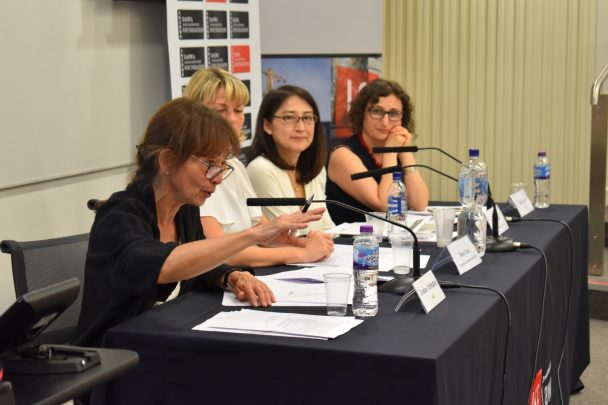 Seminar
SeminarWednesday 27 June 2018
6:30pm – 8:00pm
Closing the gender gap by 2030: Lessons from Japan and the UK
Thai Theatre, New Academic Building, London School of Economics, London, WC2A 3LJ
Organised by the Daiwa Anglo-Japanese Foundation
Fully bookedDespite the Japanese government’s commitment to creating a “society where all women shine”, progress in achieving this is still limited. In 2017, Japan dropped to 114th place on the Global Gender Gap Index produced by the World Economic Forum, evidencing the magnitude of the problem in this country. Whilst the UK was ranked 15th, there are still several areas in which the country still performs poorly, such as the gender pay gap. In this seminar, gender advisors to governments in both Japan and the UK discussed the current status of the gender gap in each country, what policies and programmes have been implemented, what challenges still exist and future recommendations. A policy analyst from the OECD then presented a wider perspective of the gender gap situation in OECD countries and their tendencies.
A link to the podcast can be found here.
The event was organised in cooperation with the Department of Law, LSE and took place at the Thai Theatre, New Academic Building, London School of Economics.
About the contributors
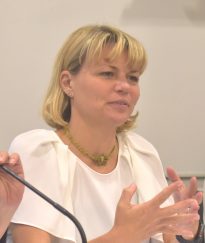
Rosy Cave
Rosy Cave is the Head of the Gender Equality Unit and the Head of the Office of the Prime Minister’s Special Representative on Preventing Sexual Violence in Conflict at the Foreign & Commonwealth Office, leading work on girls’ education, Women, Peace & Security, Preventing Sexual Violence in Conflict Initiative, Sexual Exploitation and Abuse, and LGBT rights. Prior to that Cave was at the UK’s Stabilisation Unit as Head of the MENA and Asia Team, leading on stabilisation in contexts such as Iraq, Syria, and Afghanistan. She was previously the Stabilisation Unit’s Head of Conflict and Stabilisation Team and the Unit’s Gender & Conflict Adviser. Cave has worked on conflict prevention, peacebuilding, security and justice for over 15 years for NGOs and the UN in a number of conflict-affected regions, including as Saferworld’s Director of Programmes for Asia, Europe and MENA. She is a DFID accredited Conflict Adviser and has an MSc in Latin American Politics and a BSc in Social Anthropology.
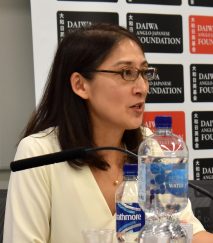
Asako Osaki
Asako Osaki, Visiting Professor at Kwansei Gakuin University, School of Policy Studies, is a specialist on gender issues. She began her career at the U.N. Development Programme, specialising in the promotion of gender equality and women’s empowerment in developing countries. Since returning to Tokyo, she has been active in mainstreaming gender in Japan’s domestic and development assistance policies and programmes, working with the Government, NGOs and research institutions. Her expertise lies in the integration of gender perspectives into policies and programmes in areas such as entrepreneurship, disaster risk reduction and reconstruction and peace and security. Osaki has spoken extensively at events both in Japan and abroad, including at the APEC Women and Economy forum 2014, where she presented on the “Economic Empowerment of Women in the Post-Disaster Reconstruction Process”. She also participated in the 2016 W20 (G20 Women’s Forum) as part of the Government of Japan’s official delegation.
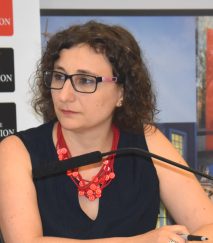
Elena Gentili
Elena Gentili is a Policy Analyst and Projects Coordinator at the Gender Equality Delivery Unit, Governance Reviews and Partnerships Division, OECD. Gentili is responsible for the development and implementation of OECD programmes, tools and products which aim to strengthen gender equality in public life across member and partner countries. Her present work focuses on data collection, analysis and policy implementation support, particularly in the areas of gender mainstreaming, gender-sensitive public institutions, women’s political participation and access to decision making. Gentili has worked for about twenty years in the promotion of gender equality and women’s human rights, specifically focusing on protection from gender-based violence and discrimination, while supporting institutional development, policy reforms, community engagement and the delivery of effective services in developed, developing and humanitarian settings. She holds an MA in Humanities from the University of Rome La Sapienza.
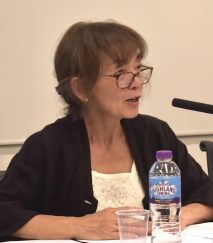
Dr Louise Arimatsu
Dr Louise Arimatsu (Chair), is a Senior Fellow with the Centre for Women, Peace and Security at the LSE, and she has taught international law in the Law Department at LSE. She is an expert on international law and, specifically, the law of armed conflict, in which she completed her PhD at LSE in 2006. Her current research focuses on the international human rights of women in conflict and post-conflict environments.